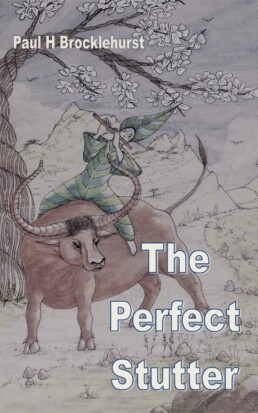PUBLICATIONS
Books, Articles and Essays describing the research and experiences upon which the SSEP’s online course is based.
The Perfect Stutter
by Dr. Paul H Brocklehurst (founder of the SSEP)
In this book, Paul discusses his own experiences of stammering and how they affected his life. He then goes on to explore what is currently known about the condition, and he describes in detail the research and experimental findings that led to the development of the SSEP online course.
From the Preface…
The journey really began in my early teens, following a number of experiences of the stutter going into remission. Although I relapsed and my symptoms returned, those early experiences impressed upon me the extent to which changes in my beliefs about stuttering appeared to have the capacity to bring about corresponding changes in the stutter itself. As I became aware of this, I started to wonder whether it may be possible to arrive at an understanding of stuttering that would permanently reduce its severity and perhaps even stop it from arising at all.
This book describes my search for that understanding.
I have divided the book into two parts: The first part – which is largely autobiographical – covers my life between the age of fourteen and forty-two. It describes the period during which, despite my efforts, the stutter remained partially out of control, and although its symptoms became substantially less severe, I was nevertheless still afraid of it. This first part ends with a description of how my understanding suddenly changed, and the fear finally relented.
In the second part of the book, I describe how my life changed after the fear had gone. In particular, I focus on my experience of returning to university – first to study speech therapy and then to research stuttering, and I discuss how this study and research deepened my understanding of the disorder and helped me to further consolidate my recovery.
I hope The Perfect Stutter will prove both useful and entertaining to anyone whose life is in some way affected by stuttering, including not only stutterers themselves but also researchers and therapists – and, indeed, anyone who is interested in the wider relationship between the ways we perceive and our ability to communicate.
‘The Perfect Stutter’ is currently available in paperback and e-book formats.
Academic Publications
Describing the research and theory upon which the SSEP Online Course is based
Perfectionism and stuttering: Findings of an online survey. Brocklehurst, P. H., Drake, E., & Corley, M. (2015). Journal of Fluency Disorders, 44, 46–53. [PDF]
Revisiting Bloodstein’s Anticipatory Struggle Hypothesis from a psycholinguistic perspective: A Variable Release Threshold Hypothesis of stuttering. Brocklehurst, P. H. Lickley, R. J., & Corley, M. (2013). Journal of Communication Disorders, 46, 217–237. [PDF]
Stuttering prevalence, incidence and recovery rates depend on how we define it: Comment on Yairi & Ambrose’ article Epidemiology of stuttering: 21st century advances. Brocklehurst, P.H. (2013). Journal of Fluency Disorders, 38, 290-293. [PDF]
The influence of anticipation of word misrecognition on the likelihood of stuttering. Brocklehurst, P. H., Lickley, R. J., & Corley, M. (2012). Journal of Communication Disorders, 45, 147-160. [PDF]
Investigating the inner speech of people who stutter: Evidence for (and against) the Covert Repair Hypothesis. Brocklehurst, P. H., & Corley, M. (2011). Journal of Communication Disorders, 44, 246-260. [PDF]
A review of evidence for the Covert Repair Hypothesis of stuttering. Brocklehurst, P. H. (2008). Contemporary Issues in Communication Science and Disorders, 35, 25-43.
Articles for the general public
- including some French and Spanish translations
Stammering and Post-Traumatic Stress – Some food for thought Article originally published 2016 by The British Stammering Association (now STAMMA)
The paradox of non-avoidance (essay – pdf)
The uses and abuses of dysfluency (essay – pdf)
Mindfulness and Stuttering: How can mindfulness help? (essay – pdf)
Orchestral Speech: A technique for when you really need to be fluent (essay – pdf)
The Jump: A powerful new technique to get out of blocks and overcome fear of stuttering (Essay – pdf)
Van Riper’s Block Modification Techniques: Might they sometimes do more harm than good? (essay – pdf)
A clinical adaptation of the Covert Repair Hypothesis by a person who stutters. Abridged version of Chapter 22 from the book “The Perfect Stutter” (Brocklehurst, P. H., 2021).
Reviewing the Covert Repair )Hypothesis Abridged version of Chapter 24 from the book “The Perfect Stutter”(Brocklehurst, P. H., 2021).
Psyscholinguistic insights into dialogue. Abridged version of Chapter 28 from the book “The Perfect Stutter” (Brocklehurst, P. H., 2021) – pdf
The Variable Release Threshold (VRT) Hypothesis of Stuttering Abridged version of Chapter 31 from the book “The Perfect Stutter”(Brocklehurst, P. H., 2021).
Stuttering, Dopamine and Incentive Learning Abridged version of an Appendix to the book “The Perfect Stutter”(Brocklehurst, P. H., 2021)
